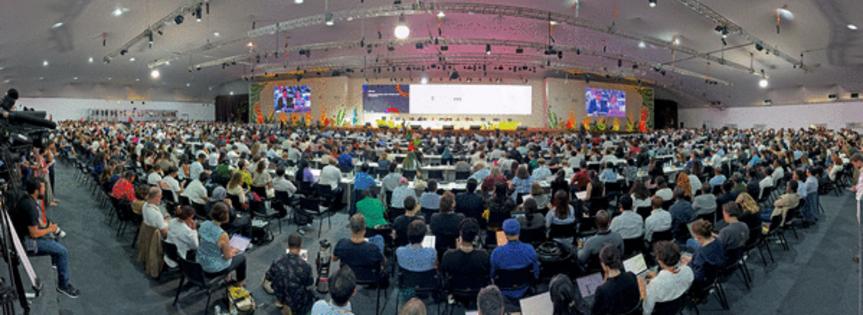Lara Williams: There's already a deal to beat dirty fossil fuels
Published in Op Eds
A United Nations climate summit has once again failed to strengthen a pledge made two years ago to transition “away from fossil fuels.” Instead these dirty drivers of the climate crisis went completely unacknowledged last weekend’s COP30 agreement. It’s disappointing, certainly, but a more ambitious outcome wouldn’t have been much better.
Even if delegates had managed to cobble together some commitment to a “fossil-fuel roadmap,” it would have amounted to yet another measly promise to begin discussing a transition plan to end our reliance on oil, coal and gas. At least we’ve now avoided getting sucked into more slow and tedious negotiations hobbled by the likes of Saudi Arabia.
The COP30 frustration simply strengthens calls to worry less about negotiation and more about delivering what’s already agreed. After all, three other pledges made at COP28 in Dubai in 2023 would land quite a punch if honored.
The world is headed for an average global temperature rise of 2.6C by 2100. This risks triggering major climate tipping points, leading to the collapse of key ocean currents, the loss of coral reefs and catastrophic sea-level rise, among other nasty prospects. It’s less terrifying than the 3.6C expected about a decade ago, but isn’t enough to ensure a safe and healthy future.
In response to this still dismal prospect, nations agreed in 2023 to get back on track via three goals, with a target date of 2030:
•Tripling renewable energy capacity globally
•Doubling the average annual rate of energy-efficiency improvements
•Substantially reducing methane emissions
If all nations managed this, then expected warming would be cut by almost an entire degree to 1.7C, according to Climate Action Tracker, an independent scientific project. Even if only G20 nations met the targets, warming would be reduced to less than 2C. That would still be a huge success, giving both human communities and ecosystems time to adapt to climate impacts.
Sadly, the world is lagging on all three pledges. Though renewable energy keeps breaking records for new capacity, the International Renewable Energy Agency reported in October that this hasn’t been enough to stay on track. To reach the trebling goal, an average of 1.12 TW of renewables needs to be added every year until 2030. In 2024, just under half of that was forthcoming.
On the second ambition of improving efficiency, the International Energy Agency reports that the main metric for tracking it — known as global primary energy intensity — is on course to rise 1.8% this year, up from 1% in 2024. This is less than half the 4% needed to meet the COP28 targets.
Strategies to get there include general electrification, shifting to more efficient appliances and insulating buildings, but the IEA found serious policy gaps. For example, the efficiency of lightbulbs has doubled in the last 15 years, but minimum performance standards have only risen 30%. Meanwhile, the world’s booming demand for air conditioning isn’t being met with efficient equipment.
Finally, emissions of methane — a short-lived but potent greenhouse gas — keep rising, despite a promise by 159 countries to lower them by 30% from 2020 levels. A global methane status report, published by the UN environment program, notes that a proper reduction needs a “boost in ambition.”
Most infuriating is that there are already ways to deliver this. Some 80% of cuts could be achieved at little cost via simple measures such as leak detection, closing abandoned oil wells and improving water management in rice cultivation.
With the need to pursue what's already been agreed comes a realization that the yearly climate gatherings aren't fit for purpose anymore. An open letter signed by more than 20 former leaders and scientists stated that the first 28 COPs delivered a policy framework to achieve the necessary reductions in greenhouse gases, but that “its current structure simply cannot deliver the change at exponential speed and scale, which is essential to ensure a safe climate landing for humanity.”
Ironically, there is no shortage of ideas on how to reform COP, from moving to a majority-vote model or splitting into smaller action-focused gatherings. The topic was debated extensively at COP30 itself, a show of self-examination that suggests the whole thing may be past its useful life. The absurd failure to even agree to the fossil-fuel phaseout roadmap strengthens that view.
A smaller group of nations led by Colombia and the Netherlands will host their own summit to advance a fair phaseout instead. With fewer delegates and a refreshing distance from the UN’s stifling rules on consensus, this might actually offer something concrete. The world needs less conversation and more action.
_____
Lara Williams is a Bloomberg Opinion columnist covering climate change.
_____
©2025 Bloomberg News. Visit at bloomberg.com. Distributed by Tribune Content Agency, LLC.
























































Comments